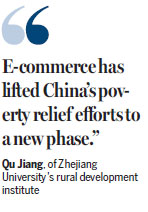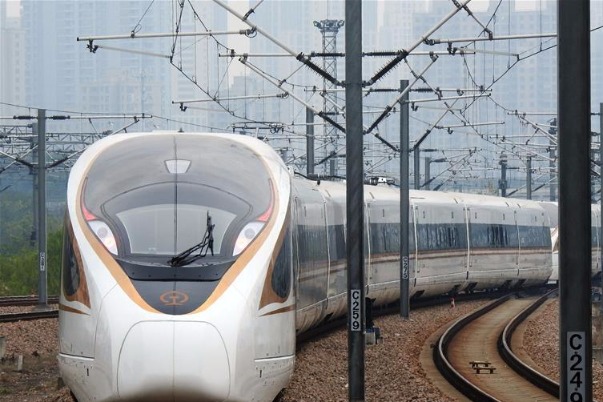E-commerce plays key role in battling poverty in rural areas
What can a two-dimensional barcode, or QR , be used for in China? The answers are varied, from mobile payment to unlocking shared bikes or adding friends on messaging apps.
But apart from making everyday life more convenient, there is one unexpected and creative use - helping the country's battle to alleviate poverty.
In Shiban Village, Southwest China's Guizhou province, every impoverished family was given a code, including Chen Dingming's.
While traditional means of gathering information about those living under the poverty line can be diffi cult and inhibit the adoption of targeted relief measures, the new technology provides an easier solution.
With one scan, the status of the Chen family is shown - a meager annual income of 2,600 yuan ($400), 50 square meters of living space and one child with cerebral palsy.
The QR code also stores information about each household's farm produce, which can be shared on the internet and reach buyers across the country.
Thanks to the system, the value of the region's specialty products sold online amounts to 200,000 yuan, not a large sum of money but a good start for residents who have struggled under the poverty line for years.
Rural areas that used to be isolated due to poor transportation infrastructure are now forging ever closer ties with markets in other parts of the country, taking advantage of the booming e-commerce sector.

On the Ministry of Commerce website, a digital map of China shows impoverished rural areas and provides links to online stores backed by local governments.
From Tibetan dried beef to pickled cabbage from Northeast China's Heilongjiang province, a variety of agricultural products from 221 impoverished counties are now available.
Up to 15 e-commerce businesses, including Alibaba Group Holding Ltd's Taobao site and JD.com Inc, are offering services for these rural stores, with marketing support and lower or no fees.
The Ministry of Commerce plans for the program to cover all national-level impoverished counties suitable for developing e-commerce by 2019.
The official project is not the only way for poor regions to take part in e-commerce. Internet fi rms are scrambling to increase their presence in the countryside, pouring money into improving logistics, building service centers and training farmers.
Jin Jianhang, president of Alibaba, said more than 800 national-level impoverished counties sold goods worth nearly 30 billion yuan via the online giant last year, with 40 counties each reporting sales over 100 million yuan.
In the bigger picture, online retail sales in all impoverished regions jumped 55 percent to 71.6 billion yuan in the fi rst eight months of the year, Ministry of Commerce data showed.
The growth outpaced the average of all rural areas by 17 percentage points.
The fruitful combination of e-commerce and poverty relief was largely attributed to government efforts to bolster infrastructure and create favorable conditions.
A document released by the central authorities in November, 2016 included measures to improve roads, broadband services, power supply and logistics, as well as support for farmers to set up online stores.
The Ministry of Commerce said a total of 12.5 billion yuan has been allocated for 756 counties, mainly in less-prosperous Central and Western regions, to develop the e-commerce sector since 2014.
"E-commerce has lifted China's poverty relief eff orts to a new phase," said Qu Jiang of Zhejiang University's rural development institute.
"An environment will be created for impoverished rural areas to achieve sustainable development, with less reliance on external aid and stronger internal impetus," Qu added.
Poverty reduction has continued to be a priority for the Chinese government in recent years and remarkable progress has been made.
Some 6.39 million people annually have been lifted out of poverty during the last 15 years of the 20th century. An ambitious goal has been set to eradicate poverty by 2020, which means roughly 10 million rural people must be lifted out of poverty each year.
As the poverty alleviation eff orts are in full swing, e-commerce is expected to play an even greater role.
At a meeting last month, Vice-Premier Wang Yang said the government should make e-commerce more targeted and effective in reducing poverty to benefi t more people, promising stronger policy support and a more favorable business environment.
Xinhua
(China Daily USA 11/16/2017 page15)


















